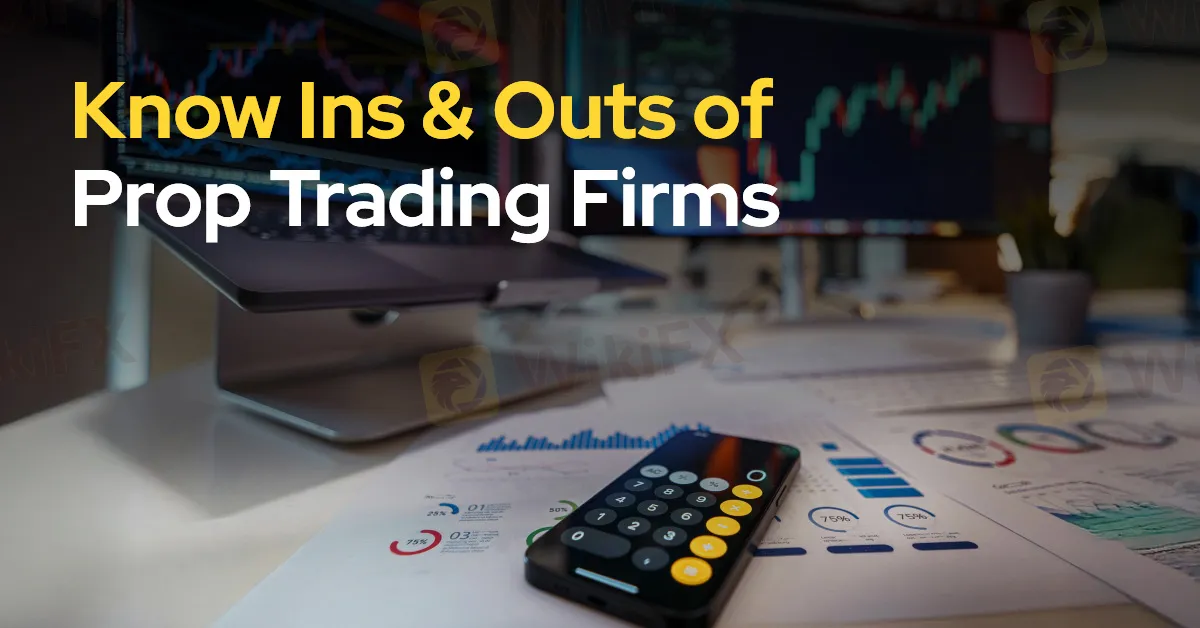Know Ins & Outs of Prop Trading Firms
Sommario: This trend is largely liked by the new generation of traders who crave faster returns. Therefore, in this article, we will explore the various aspects of proprietary trading firms and dive into the details of it. Let’s begin.

The popularity of prop trading firms has skyrocketed in recent years, with a staggering increase in the number of firms launched in the past years. This trend is largely liked by the new generation of traders who crave faster returns. Therefore, in this article, we will explore the various aspects of proprietary trading firms and dive into the details of prop trading firms. Lets begin.
What are Prop Trading firms?
Proprietary Trading (Prop Trading for short) refers to a model in which financial institutions or professional traders use their own funds instead of client funds to invest or trade in the market to obtain direct profits. This type of trading usually covers multiple asset classes, such as stocks, bonds, foreign exchange, commodities, and derivatives.
Types of Prop Trading firms?
There are various types of prop trading firms. The following are the major ones.
1. Market-Making Firms: provide liquidity to markets by buying and selling securities, profiting from the bid-ask spread.
2. Independent prop trading firms: are companies that trade with their own capital and are not affiliated with any larger financial institution, such as a bank or investment bank. Independent prop trading firms are: Self-funded & Flexible.
3. Broker-Dealer Prop Trading Desks
Broker-dealer prop trading desks are departments within brokerage firms that execute trades for clients while also trading for their own accounts.
4. Bank Prop Trading Desks
Bank prop trading desks are parts of major financial companies that trade the bank's capital. These desks take advantage of the parent banks.
How do they work?

Prop firms make money through market trading, which involves buying and selling specific combinations of stocks and other financial instruments.
For example, if a proprietary trader feels that the price of a specific stock will fall during the day, he can sell shares of that stock in the market and then buy the same stock at the end of the day when prices are lower. As a result, he is selling at a greater rate and purchasing at a lower rate.
Pros & Cons of Prop Trading Firms?
Advantages
• New sources of revenue: Increase the institution's diversified revenue streams through challenge fees, profit sharing from trading, and high-frequency trading.
• Flexible operation: traders can cooperate with multiple proprietary companies, and institutions do not need to hire traders regularly, reducing labor costs.
• Support and advice: Prop firms have a group of professional traders who are available to offer support and advice, which can be very beneficial for novice traders.
Disadvantages
• Relying on traders' ability: Traders' performance directly determines the institutions' returns, bringing some uncertainty.
• Regulatory Risks: As markets evolve, global regulation of proprietary trading may become increasingly stringent, affecting the way operations are conducted.
• Market volatility risk: Large capital exposures can result in significant losses in the event of high volatility.
Prop Firms Getting Popular
As prop firms are gaining popularity. Many Famous brokers are forming their prop firms to attract users. Here is a list of brokers who have currently launched their prop trading firms:
Hantec Group Launched Proprietary Trading Firm Hantec Trader.
BDSwiss Ex-CRO Launched Proprietary Trading Brand thePropTrade,
IronFX Founder Introduced Proprietary Trading Brand Ultimate Traders,
Axi Introduced Prop Trading Program Axi Select
Ex-CCO of cTrader to Launch Proprietary Trading Firm PipFarm,
Prop Trading Firm MyFundedFX Collaborates with Blueberry Markets
Difference B/w Forex Brokers & Prop Trading firms
Here are the major differences between Forex Brokers and Prop Trading Firms:
Forex Brokers:
- Act as intermediaries between traders and the market
- Provide access to the market for individual traders
- Charge commissions, spreads, or both for their services
- Do not trade with their own capital
- Primary goal is to provide a platform for traders to buy and sell currencies
Prop Trading Firms
- Trade with their own capital
- Offer a share of the profits to their traders
- Focus on trading performance and profit generation
- use advanced algorithms and high-frequency trading strategies
- Primary goal is to generate profits from trading activities
Conclusion
Ultimately, whether or not to use a prop trading firm depends on your individual trading goals, risk tolerance, and preferences. It's important to remember that prop trading firms are not a one-size-fits-all solution, and it's crucial to carefully evaluate the pros and cons before making a decision.

WikiFX Trader
FXTM
Exness
DBG Markets
FXCM
CPT Markets
GMI
FXTM
Exness
DBG Markets
FXCM
CPT Markets
GMI
WikiFX Trader
FXTM
Exness
DBG Markets
FXCM
CPT Markets
GMI
FXTM
Exness
DBG Markets
FXCM
CPT Markets
GMI
Rate Calc
